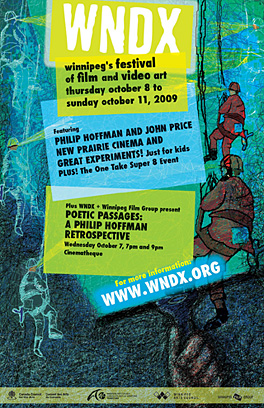WINNIPEG’S FESTIVAL OF FILM AND VIDEO ART
Wednesday October 7 – Saturday October 10, 2009
Curated by Cecilia Araneda
Introduced by Philip Hoffman
 DEATH, LIFE, LOVE, MEMORY AND LOSS TOGETHER COMPRISE THE ESSENTIAL STUFF THAT FORMS THE OEUVRE OF CANADIAN EXPERIMENTAL DOCUMENTARY FILMMAKER PHILIP HOFFMAN
DEATH, LIFE, LOVE, MEMORY AND LOSS TOGETHER COMPRISE THE ESSENTIAL STUFF THAT FORMS THE OEUVRE OF CANADIAN EXPERIMENTAL DOCUMENTARY FILMMAKER PHILIP HOFFMAN
“Indeed, in an interview with Barbara Sternberg, Hoffman acknowledges that “not all filmmakers deal with death so directly, or so often” as he has within his body of work. And yet, this is just the start, because there is no single way to merely ‘watch’ a Hoffman film; when you enter the darkened space of the cinema, you become a participant within Hoffman’s memories and you come to know Hoffman as a person perhaps better than you know yourself.
Hoffman hands down film in a very personal and transformative way, without much fanfare, but in a way that indelibly impacts the receiver. If documentary is “the telling of a story or illumination of themes, as poetry is a story or theme told by images,” as defined by John Grierson – long recognized as the ‘father’ of documentary in Canada through his influence in the establishment the NFB – and poetry “uses many effects of sound, imagery and vocabulary to achieve a heightened, intensive form of expression,” as the Gage Canadian Dictionary posits, then Hoffman is indeed a master documentarian through his poetic diary cinema experimentations, even as he actively seeks to purge “the ghost of Grierson” with his work at the same time, replacing the traditionally strong educational leaning of the documentary form with something that is far more personal.
Philip Hoffman is well recognized as one of the most influential filmmakers working in Canada today, not only for the exceptional quality and depth of his own body of work, but also for his 15 year old Independent Imaging Retreat – or Film Farm, as it is better known. Even in Winnipeg, Hoffman’s Film Farm was the integral underpinning to a new do-it-yourself aesthetic that emerged in the early 2000’s through the Winnipeg Film Group’s Film Experiment workshop series initiated by Film Farm alumnus Solomon Nagler. This series saw as its direct legacy a new generation of film craftspersons and curators emerge in the city, including such notables as Mike Maryniuk and Jenny Bisch, along with countless others, and transformed the directional path of filmmakers such as Carole O’Brien, who evolved from a traditional narrative approach to working to becoming one of the most accomplished experimenters in film working in Winnipeg today.
— Cecilia Araneda